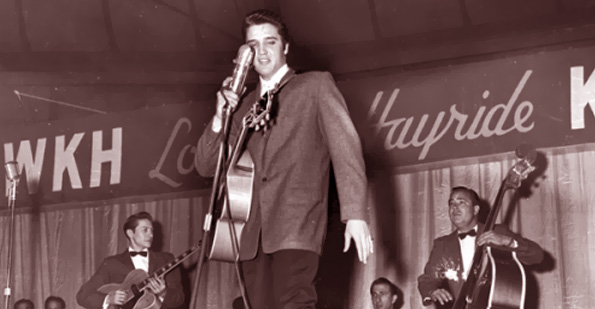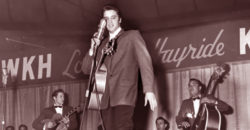Elvis has not left the building
Published: December 10, 2015
Last Updated: December 18, 2023

by Ben Sandmel
Although Shreveport’s Louisiana Hayride has not graced the nation’s airwaves since 1960, this historic country music radio program is still a revered and influential cultural icon. Performed before a live audience at the city’s Municipal Auditorium and broadcast nationally by KWKH and associates, the Louisiana Hayride nurtured a wealth of Southern musicians over the course of its 22-year run. Many artists who gained their first significant exposure on the Hayride went on to attain much broader acclaim; among these notables are Hank Williams, Jim Reeves, Elvis Presley, North Louisianan Webb Pierce, and Cajun-country musicians from South Louisiana such as Jimmy C. Newman and Doug Kershaw. In addition, many musicians who performed on the Hayride remain active in Shreveport today, including vocalist and songwriter Maggie Lewis Warwick, guitarist James Burton, and bassist/entrepreneur Tillman Franks.
A recent series of CDs reprises great moments culled from various Hayride broadcasts. Perhaps the most illuminating of these is Good Rockin’ Tonight –The Evolution of Elvis Presley – The Complete Louisiana Hayride Archives (Music Mill). This two-CD set traces Presley’s growing self confidence as a performer, and also includes material that he never recorded or released commercially, such as Chuck Berry’s proto-rock classic “Maybelline,” and LaVern Baker’s rhythm and blues hit “Tweedle-Dee. “There are also numbers that feature Presley with atypical accompaniment, such as steel guitar, that are not present on famous-hit renditions of these songs.
Good Rockin’ Tonight combines Presley’s songs with extensive commentary by Frank Page, a former emcee who introduced Presley at his Hayride debut in 1954. Although some listeners will simply want to hear Elvis sing, Page’s material is informative and insightful. His carefully scripted, formal style reflects the conservative nature of the mainstream country-music industry but also shows obvious respect for Presley’s atypical talent. (Presley was one of the few Hayride stars who did not “graduate” on to the Grand Ole Opry, but went instead to mainstream pop stardom.)
While all the performances here are inspired, the sound quality on these archival Presley recordings varies considerably, and some songs are repeated, including four versions of “That’s All Right, Mama.” Accordingly, Good Rockin’ Tonight may not be a first-priority purchase for non-fanatics, although Presley completists will it indispensable. The stage patter is fascinating, and the numerous covers of R&B hits underscore Presley’s admiration of, affinity for, and indebtedness to the music of African Americans. The fact that Presley performed such material at a conservative country venue reveals his broad musical vision and the sweeping social changes that it reflected and helped enhance. At the same time, his appearances at the Hayride reinforce the fact that country music — just like blues and R&B -was an important component in the nascent genres of rock and rockabilly.
Presley can also be heard on the Hayride anthology classic Rockabilly Radio (Music Mill) in a rousing, erotic rendition of “Baby, Let’s Play House.” Such shack-up songs would hardly raise many eyebrows today, but they were considered quite extreme in the conformist mid-’50s. Other highlights include fine performances by Presley’s then label-mate at Sun Records, Johnny Cash, on “When Luther Played the Boogie” and “Big River.” The compilation ends with an onstage announcement by Frank Page that has emerged as a ubiquitous and enduring pop-culture quotation: “Elvis has left the building.”
The Louisiana Hayride was a country venue, first and foremost. Four CDs on the Music Mill label focus on this rich legacy. Classic Country Radio, Volumes 1-4, feature a who’s who of country luminaries from the Hayride’s heyday, including Johnny Horton, Roy Acuff, Hank Williams, Hank Snow, T. Texas Tyler, Loretta Lynn, Kitty Wells, Marty Robbins, and more. One of the strongest performances is “Color of the Blues”, on Volume 4, by the brilliant singer George Jones. Jones’ deft, twangy, jazzy phrasing suggests a magical merger of Frank Sinatra, Aaron Neville, and Billie Holiday, all rolled into one exquisitely mournful crooner. Volume 4 is also highlighted by Webb Pierce’s “More and More,” while the Louvin Brothers grace Volume 3 with their delicate “close harmony” on “My Baby Is Gone.”
This valuable reissue series is not the only indication that interest in the Louisiana Hayride remains high. The Hayride will be an important topic at the Southern American Music Conference held in Shreveport from May 2-4, 2002. At press time the confirmed speakers are Kip Lornell — co-author of a fine biography of Leadbelly, among other projects — and Peter Guralnick, whose prolific output includes an acclaimed two-volume biography of Presley. The weekend will be climaxed by a Hayride show at the Municipal Auditorium. For details, call (318) 227-9110 or e-mail [email protected]. A trove of Hayride information is also available in the documentary film Cradle of the Stars produced by in 1984 by Louisiana Public Broadcasting, and in the books Elvis, Hank and Me, by Horace Logan with Bill Sloan (St. Martin’s Press, New York, 1998) and I Was There When It Happened by Tillman Franks with Robert Gentry (Sweet Dreams Publishing, Many, La., 2000).
Back in South Louisiana — and many other places, for that matter -there’s quite a buzz about a strong new album by Dr. John (a.k.a. Mack Rebennack) entitled Creole Moon. The album recalls the sound of such mid-’70s classics as “Right Place, Wrong Time” and “Dessitively Bonaroo,” which are regarded as some of Rebennack’s best work. Of particular interest, in cultural terms, is “Monkey and the Baboon,” which is based on an archaic African American folktale, and has been recorded by such diverse artists as the jazz-and-jive singer Cab Calloway, and the x-rated comedian Rudy Ray Moore.
——
Ben Sandmel is a New Orleans-based freelance writer, drummer and folklorist. He was formerly the drummer/producer for the Grammy-nominated Cajun band, the Hackberry Ramblers and author of Zydeco! and Ernie K-Doe: The R&B Emperor of New Orleans.
